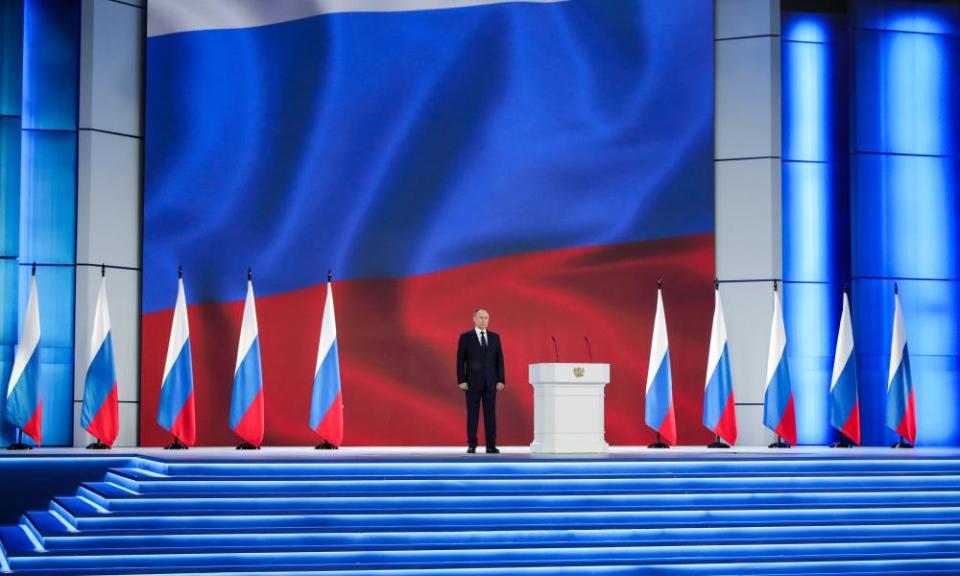Thousands of Russians attend rallies calling for Alexei Navalny’s release

Tens of thousands of Russians have rallied in cities across the country in a last-ditch effort to secure the freedom of the jailed opposition leader Alexei Navalny.
The unsanctioned demonstrations have shown the determination of Navalny’s core supporters, who called for “freedom for political prisoners” in tense standoffs with riot police in helmets and body armour, who had vowed to disperse any gatherings.
The nationwide protests fell short of the 500,000 demonstrators that Navalny’s team had sought to bring out on to the streets, but large crowds of up to 10,000 in Moscow and a similarly robust turnout in St Petersburg may at least let them call the evening a draw.
The show of strength is important as the Kremlin prepares to deliver a potentially lethal blow to Navalny’s political organisation nationwide by declaring it extremist.
“Even if they lock [Navalny] up, tonight shows that other figures will come forward, people will come out, that there is a future for the opposition,” said Arkady, a university professor, who was standing among Navalny supporters on a street corner across from the Kremlin.
On Wednesday morning, police arrested Navalny’s aides Lyubov Sobol and Kira Yarmysh, and raided his regional headquarters in cities across the country in a show of strength designed to keep people off the streets.
The day of action coincided with Vladimir Putin’s annual address to the nation, in which the Russian president warned western leaders they would “regret” crossing Russia’s “red lines”.
Pro-Navalny demonstrations had been called in more than 100 cities in response to reports of his declining health during a hunger strike in prison. There were surprisingly large crowds in some cities and even in some small towns, such as Usolye-Sibirskoye in Siberia, while turnout appeared to fall short elsewhere.
UN human rights experts called on Russia to allow Navalny to be medically evacuated and treated abroad, saying they believed his life was at risk. Navalny has been kept in harsh conditions in a high-security penal colony and “denied access to adequate medical care”, conditions that may amount to torture, they said, adding: “We believe Mr Navalny’s life is in serious danger.”
Early reports said the number of arrests was relatively low, with 400 protesters detained nationwide by 9pm Moscow time. Those numbers were expected to increase as police sought to break up the rallies.
Navalny’s aides had described the rallies as the “final battle between good and neutrality” – a play on the title of the Livejournal blog on which Navalny built his political career. “It seems to us that we’ve indeed reached the point of massive repressions,” Ivan Zhdanov, the head of Navalny’s Anti-Corruption Foundation, told the news outlet Current Time. “If we’re recognised as an extremist organisation, it will become far harder to engage in legal, open activity.”
Police cracked down harshly on pro-Navalny protests earlier this year, detaining more than 5,000 people in a single day. Supporters on Wednesday said they were prepared for a crackdown.
“I don’t think anything can change [Putin’s] mind, but I feel a debt [to go],” said Anna, a designer. “In the worst case I can face an arrest, I can take some time away, and I don’t have a boss or someone who can punish me. Everyone I know knows how I feel about this, they expect me to be there.”
Tensions have grown between Moscow and western capitals over concerns about Navalny’s health in prison, as well as Russia’s military buildup on the border with Ukraine, and accusations of aggressive Russian intelligence operations including a fatal explosion at a Czech ammunition dump in 2014.
Putin delivered his annual televised address at midday, stoking speculation that Russia could send more troops into Ukraine or move to consolidate greater control over Belarus, its neighbour and ally.

The state-of-the-nation-style address has served as a platform for president to announce key initiatives before, including the 2020 constitutional referendum that ultimately allows him to retain the presidency until 2036.
Wednesday’s speech passed mostly without incident, as Putin focused on a domestic agenda dedicated to raising life expectancy, called for Russians to vaccinate themselves against coronavirus, and delivered cash handouts to Russian families in measures that are likely to please voters ahead of September’s parliamentary elections.
While he did not make specific foreign policy announcements, Putin did accuse the west of attempting to intervene in politics in Ukraine and Belarus. “The practice of organising coups, plans for political killings, including of top officials, is too much. They have crossed all boundaries,” he said.
Putin also said that those who threatened Russia’s “core interests” would “regret it”, seeking to portray protests in Ukraine and Belarus, or Navalny’s supporters in Russia, as extensions of US foreign policy.
Related: Ukraine still outgunned as Russia prepares for larger conflict
“If anyone mistakes our good intentions for indifference or weakness and plans to burn or even blow up those bridges, they should know that Russia will respond asymmetrically, swiftly, and harshly,” he said.
Before the speech, the Ukrainian president gave a televised address, saying that the country did not want war and calling on Putin in Russian to meet for talks.
Putin has blamed Ukraine for the rise in tensions in the Donbas region, while sending tens of thousands of troops along with tanks, missile artillery and short-range ballistic missiles to the region bordering Ukraine.

 Yahoo Finance
Yahoo Finance 